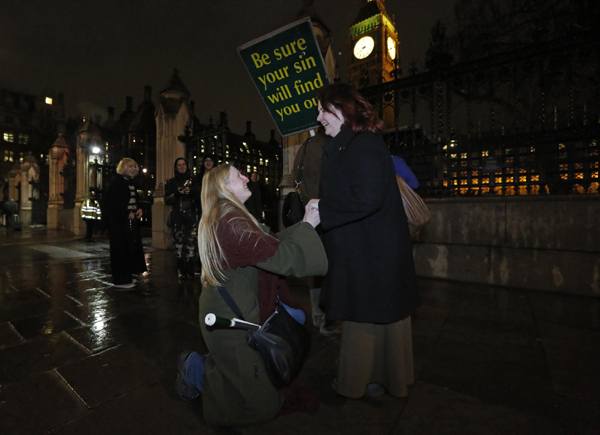Cameron's party split as gay marriage vote passes
Updated: 2013-02-06 09:56
(Agencies)
|
||||||||
GRIEVANCES AGAINST CAMERON
Conservative MPs' grievances are many: that Cameron is "arrogant", that he is too fond of the European Union, that the party's policies have been diluted by its coalition partner after Cameron failed to win the last election outright, and a nagging fear that he will not win the next one.
The gay marriage initiative has infuriated rank-and-file party activists and a protest letter signed by 25 past and present chairmen of local Conservative associations warned that members were starting to resign over the issue.
 |
|
Elizabeth Maddison (L) proposes marriage to her civil partner Hannah Pearson in front of Parliament in London, Feb 5, 2013. [Photo/Agencies] |
Justin Welby, the newly elected Archbishop of Canterbury and head of the world's 80 million Anglicans, used his first comments after being confirmed on Monday to reiterate his won opposition to gay marriage.
Faced with strong opposition from the Anglican and Catholic churches, the law would not force them to conduct gay marriages, but critics say gay people may launch legal challenges.
A YouGov poll for the Sunday Times on Sunday showed 55 percent favoured legalising gay marriage, while 36 percent opposed it. However, the same poll showed the issue was not one that concerned most voters.
The new law proposes legalising same-sex marriage in 2014. It would also allow civil partners to convert their partnerships into marriages.
Gay marriage supporters say that while existing civil partnerships for same-sex couples afford the same legal rights as marriage, the distinction implies they are inferior.
In a sometimes emotional debate on Tuesday, several gay MPs from different parties took to their feet to commend the bill, describing the prejudice they had suffered growing up.
"Millions will be watching us today," said Nick Herbert, a gay Conservative MP. "Not just gay people but people who want to live in an equal society."
The vote was warmly welcomed by Cameron's junior coalition partners, the Liberal Democrats, and by the opposition Labour party, while gay rights group Stonewall called the result "a truly historic step forward".
Tuesday's vote in the House of Commons was "free", meaning MPs were able to vote according to their conscience, rather than under party orders.
The bill is still many stages away from becoming law, and some of its opponents called on Cameron after the vote to consider amending it to appease their concerns, promising they would try to frustrate its progress through parliament.
WARNING OF DIVISIONS
Peter Kellner, president of pollster YouGov, said he felt the parliamentary rebellion would hurt the Conservative party.
"For Cameron, gay marriage is part of his attempt to persuade the voters that his party belongs to modern, 21st century Britain," he wrote on the pollster's site.
"But the divisions that the gay marriages bill has unleashed ... threaten to send an altogether different message: that the Tories are divided, out of touch and prone to quarrel over issues of little concern to most voters."
With the next election still two-and-a-half years distant, there is a risk that internal party splits over issues like gay marriage could fester and turn what for now is only talk of a possible leadership challenge into the real thing.
"David Cameron has split the Conservative Party in half on gay marriage and failed to win a majority of Tory MPs. Labour win," Jackson, the Conservative MP, wrote after the vote.
Related readings:
Support for same-sex marriage in Paris
US Supreme Court to review same-sex marriage cases
Protests against gay marriage in Paris
Gay marriage votes could sway US Supreme Court

 Li Na on Time cover, makes influential 100 list
Li Na on Time cover, makes influential 100 list
 FBI releases photos of 2 Boston bombings suspects
FBI releases photos of 2 Boston bombings suspects
 World's wackiest hairstyles
World's wackiest hairstyles
 Sandstorms strike Northwest China
Sandstorms strike Northwest China
 Never-seen photos of Madonna on display
Never-seen photos of Madonna on display
 H7N9 outbreak linked to waterfowl migration
H7N9 outbreak linked to waterfowl migration
 Dozens feared dead in Texas plant blast
Dozens feared dead in Texas plant blast
 Venezuelan court rules out manual votes counting
Venezuelan court rules out manual votes counting
Most Viewed
Editor's Picks

|

|

|

|

|

|
Today's Top News
Boston bombing suspect reported cornered on boat
7.0-magnitude quake hits Sichuan
Cross-talk artist helps to spread the word
'Green' awareness levels drop in Beijing
Palace Museum spruces up
First couple on Time's list of most influential
H7N9 flu transmission studied
Trading channels 'need to broaden'
US Weekly

|

|








